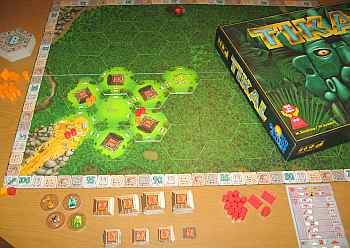Spend Your Points Wisely in Tikal
Tikal is a fun Euro board game created by a pair of my favorite designers – Wolfgang Kramer and Michael Kiesling. Mr. Kramer is one half of another duo who designed one of my favorite board games of all time, El Grande.
Quoting from the rule book printed in 2005…
 “Tikal is the most important and largest of all Mayan sites. It is located in the midst of an impenetrable jungle in northern Guatemala. The Mayans lived in Tikal from 600 BC to 900 AD, but little is known of the civilization that thrived there for 1500 years. As of this writing only a small fraction of the site has been excavated and investigated. Up to 4 expeditions plan to further explore the site to excavate and recover other temples and treasures.”
“Tikal is the most important and largest of all Mayan sites. It is located in the midst of an impenetrable jungle in northern Guatemala. The Mayans lived in Tikal from 600 BC to 900 AD, but little is known of the civilization that thrived there for 1500 years. As of this writing only a small fraction of the site has been excavated and investigated. Up to 4 expeditions plan to further explore the site to excavate and recover other temples and treasures.”
That is the basis of this game; you get to play one of the 4 expedition leaders who sends a team into the jungle to discover temples and claim treasures. Claim the biggest temples and most treasures to win.
On your turn, you place a new hex tile on the board, effectively clearing a new area for exploration. That tile may have a temple site or a hidden treasure in the center. You can send your team, represented by wooden barrels (similar to those found in Puerto Rico), into new areas of the board provided you have action points remaining.
You are allotted 10 action points at the start of your turn. Normally you’ll want to spend all of them performing one or more of the following actions.
- Place a new team member into a camp (base or personal) – 1 pt.
- Move a team member to an adjacent cleared hex – cost depends on stepping stones between
- Uncover (add to) a temple – 2 pts.
- Recover a treasure – 3 pts.
- Exchange previously discovered treasures – 3 pts.
- Setup a personal camp – 5 pts.
- Guard (claim) a temple – 5 pts.
There are 3 treasures of each type. You might want to exchange treasures with other team leaders because their value increases if you own a pair the same type. It increases even more if you can gather all three.
Setting up a new camp further into the jungle allows your team members to move about more quickly. It’s as if they have a secret tunnel between camps that only your own team members know about and can access. They can hop or teleport or use a port key to move directly from camp to camp, bypassing all the jungle hexes in between.
Claiming a tall – and therefore high-scoring – temple means that no one else can score that temple for the remainder of the game. Temples in Tikal can otherwise change hands and be scored by multiple players during a scoring round, if left unguarded.
Whenever a volcano hex tile is uncovered and placed on the board, play pauses and a scoring round occurs. Following scoring, play resumes as usual. When all hex tiles have been placed; that is, the entire Tikal site has been cleared, the game ends and a final scoring round happens.
There is an auction variant to Tikal, for those who really like auctions (not me), which I have not yet tried. For me, the base game is enough and is great fun. It’s one of those games that just doesn’t get to the table often enough. It’s also one where there is a lot of down time between turns, because you can’t really do any planning ahead and determining how to spend your 10 action points takes some time.
Check the price of Tikal on Amazon.
